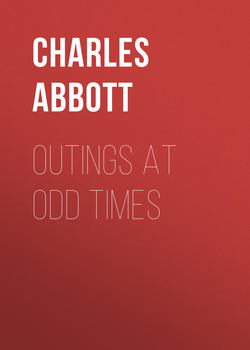Outings At Odd Times

Реклама. ООО «ЛитРес», ИНН: 7719571260.
Оглавление
Abbott Charles Conrad. Outings At Odd Times
PREFATORY
PART I. IN WINTER
A Winter Sunrise
Midwinter Minstrelsy
A Cold Wave
The Woods in Winter
Old Almanacs
A Quaker Christmas
A New Place to Loaf
Round about a Spring in Winter
A Bay-Side Outing
Free for the Day
An Open Winter
A Foggy Morning
The Old Farm’s Wood-Pile
PART II. IN SPRING
The April Moon
Concerning Small Owls
A Hidden Highway
Weathercocks
Apple-Blossoms
The Building of the Nest
A Meadow Mud-Hole
An Open Well
PART III. IN SUMMER
A Noisome Weed
A Wayside Brook
Wayside Trees
Skeleton-Lifting
Why I prefer a Country Life
A Midsummer Outing
A Word about Knowledge
The Night-Side of Nature
The Herbs of the Field
PART IV. IN AUTUMN
A Lake-Side Outing
Dew and Frost
A Hermit for the Day
Snow-Birds
Blue Jays
The Growth of Trees
Fossil Man in the Delaware Valley
Отрывок из книги
The waning moon was scarcely visible in the western sky and not a star shone overhead, when I ventured out of doors, at the call of the gathering crows. These noisy scavengers of the river’s shore had evidently slept with one eye open, and at the first faint glimmering of the dawn signaled, in no uncertain tones, the coming day. Across the brown meadows floated their clamorous cries and roused me when my own slumber was most profound; but I responded promptly, willing at least, if not wildly anxious, to witness a winter sunrise.
I have said the meadows were brown; such was their color when I saw them last; but now, every wrinkled blade of last year’s grass was daintily feathered with pearly frost. A line, too, of steel-gray crystals topped every rail of the old worm fence, and capped the outreaching branches of the scattered trees. The glint of splintered glass filled the landscape.
.....
John Blank is one of those unfortunates who desire to be thought a genius. To float with the current is beneath his dignity. Uz Gaunt described him well as one who persists in looking toward the west to see the sun rise. Knowing my love for the open fields, this would-be genius has kindly treated me, of late, to innumerable accounts of recent observations of beasts, birds, reptiles, and wild life’s less noble forms, and certainly the man has remarkable powers in one direction – he can misinterpret admirably. “Think of it!” he exclaimed excitedly; “here it is December, and I have heard a frog croak! It was not a springtime croak, of course, but a cry of pain, and I believe a musk-rat dug it out of its winter quarters, and the sound I heard was a cry of pain.” It is a wonder that he did not hear the musk-rat’s chuckle over a good dinner, also. Here we have three assumptions – that frogs never sing in winter; that they habitually hibernate; and that musk-rats dig them out of the mud. The aforesaid John Blank had lived forty-odd years on a farm, and did not know that frogs voluntarily sang or croaked during mild winter days. Like many another, finding that it is cold in December, he turns his back on winter sunshine.
Here are some statistics concerning frogs in winter. Previous to Oct. 20, 1889, there had been white frost, some chilly days as well as nights, and yet the frogs sang merrily on that date. There was frost, snow, and ice during the following week, and then these same frogs were again in full chorus; and later, in November, as late as the 19th, they rattled and piped, not only in the sheltered marshes, but among the wilted stalks of lotus in an exposed upland field. Then a long interim, when I was constantly in town, but at noon, December 19, I heard them again, and on Jan. 12, 1890, frogs of at least two species were croaking; and, too, bees were about, snakes were sunning themselves, turtles crawled from the mud, and salamanders squatted on dead oak leaves in the full glare of an almost midsummer sun. When John Blank was told of this he looked his name; but he was not disconcerted. “Did you ever examine the marshes in winter?” I asked.
.....